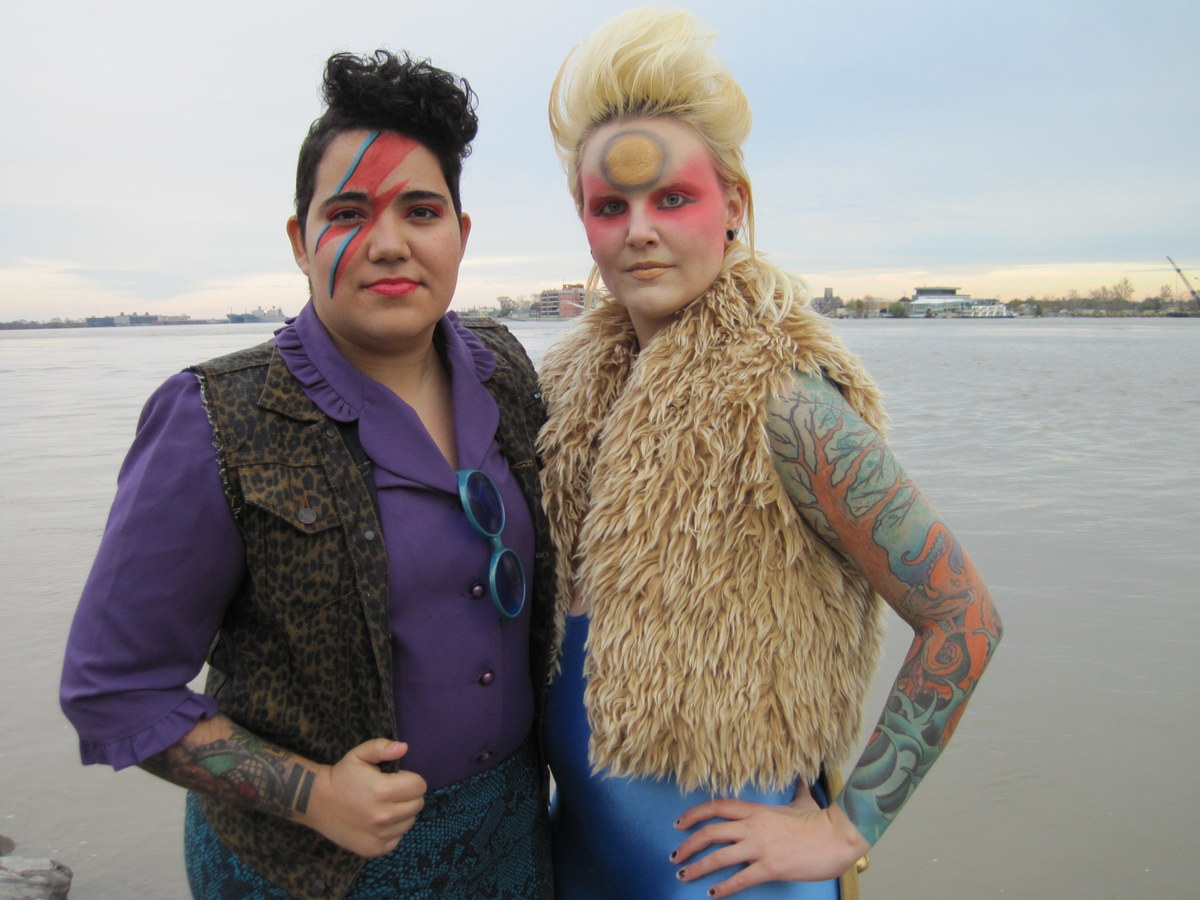
“David Bowie died the way he lived,” said the Australian newscaster Richard Wilkins, “with dignity and style, a class act all the way.”
In the days and weeks after Bowie’s death, the tributes poured in: letters, videos, mentions at award shows and fashion premiers, and here in New Orleans, a second line parade, attended by this death blogger. While Bowie’s life was impressive, the manner in which he exited that life—with a string of creative projects gently alluding to his impending earthly departure—was impressive in its own right. And Bowie’s well-orchestrated departure is also part of a larger trend. As reaction slowly builds against the distant and ungratifying rituals of death that have become the norm in countries like the U.S. and Britain, more and more people appear to be customizing and designing not just what their funerals will look like or what will become of their bodies or ashes, but the very parameters of their own death.
Can a person transform their death into an artistic statement? Can a person envision their own death in such a way that it actually becomes part of the creative oeuvre that was their life? And perhaps the most important issue, can simply pondering these questions help breakdown the anxiety many people have about death?
Bowie brought these questions to the surface, and surely others will keep asking them.
“As the Baby Boomer generation continues to age and encounter infirmity and terminal disease, they will continue to demand greater control, refusing to follow doctors into painful treatments and life-extending measures,” reads a Guardian article that appeared right after Bowie’s death. “A good death to this demographic group does not come to the oldest, but to those who have lived well up to the very end.”
It is perhaps the most elementary and profound—yet often most un-talked about—human concern, will I find the courage to be able to die right? And what does dying right even mean? Is orchestrating one’s death an appropriate response to death? Is it a beautiful response, is it a natural response? Or is allowing nature to take its course the more organic way to face an end? I think of the Inuit of the Arctic, who in a harsh land of limited resources used to abandon their elderly on ice floes, or shut them up inside igloos. I think of Japan’s legendary Granny-dump Mountain, where sons used to abandon aging parents to perish of exposure and starvation.
The Greek historian Herodotus, who lived 2500 years ago, tells the story of Croesus, the King of Lydia. He was a wealthy and conceited man, yet still of course had his insecurities. “Who is the happiest man you have ever seen?” Croesus asks of the great teacher, Solon the Athenian. He is disappointed to find that the answer is not him, but a man named Tellus.
“And what is your reason for this choice?” Croesus demands.
Solon explains his answer. Tellus’s city was prosperous, and he had fine sons, and lived to see them bear fine sons of their own. But most importantly, Tellus died a glorious death, during battle with a neighboring town.
“You seem to be very rich,” Solon explains to Croesus, “and you rule a numerous people; but the question you asked me I will not answer, until I know that you have died happily.”
Sure, Tellus’s death was not intertwined with art and music, and instead involved battle and war, but the point is the Greeks believed the character of a person could not be judged in full until not only their life-gained attributes were tabulated, but their death-gained ones too.
This is something I think about often, a rather dark thought, I do not know, but an elemental one, the idea that all of life is a preparation for death. That death is not just the final test, it is the test, and how you perform on it—or better put, how you approach it, the smile you wear, the tone you take—is just as important if not more important than everything that has come before. But the thought need not be as dire as it sounds, for if all of life is a test for death, then the way you die will naturally be an extension of the way you live. Thus one need not worry about orchestrating a good death, you will invariably be led to a death congruous to the life you have lived.
There is a story that speaks to these thoughts by one of my favorite authors, Yasushi Inoue, called Passage to Fudaraku, published in his collection, Lou-lan and other Stories. The story is about a death ritual that becomes popular among a certain group of 16th-century Japanese monks, that is, shutting oneself up in a small boat and attempting to sail across the waves to a higher realm.
“It had become a custom for devout worshippers to set sail from the Kumano coast for the mythical isle in the hope of being received by Kannon incarnate, in whose Pure Land they would be reborn,” writes Inoue. “The voyager would be confined in a doorless wooden box nailed securely to the bottom of a boat; his only provisions would be an oil lamp that would burn out in a matter of days and a small quantity of food.”
The story’s protagonist, Konko, carefully observes other monks prepare for their “fatal” voyages. Some monks depart with dignity and grace, others do not. Of a monk named Nichiyo, it is said: “He seemed very unhappy, indeed wretched. His expression was one of such despair as Konko had not known before. He stood motionless for a time, his dry foot on the boat and his wet foot on the gangplank, and then stepped aboard as if resigning himself to fate.”
We come to learn that Konko is anxious about his own impending boat trip to Fudaraku, in part because he feels it was forced upon him, and that he is not ready for such a journey. Konko eventually resigns himself to his fate, but frets over whether or not he will be able to maintain his composure when the fateful day comes. “Konko had noticed in the faces of past voyagers…joy in anticipation of new life, never sadness or fear…what would his expression be then? He did not quite know, but it must be one that would be appropriate to a truly devout monk setting sail for Fudaraku.”
Konko remains anxious, and this anxiety outweighs the spiritual enlightenment that is supposed to accompany the journeyer. He is “disconcerted by the growing expectations,” and devolves into a state of languor. “If a visitor spoke to him, Konko did not answer…By November, he had lost all awareness of time. When he awoke he would call Seigen. ‘Isn’t this the day for my voyage?’ he would ask. Told that it was not, he would lift his head in apparent relief, and look upon the white sands of the garden…”
And perhaps this is where the brilliance of Bowie comes in, because unlike the monk Konko in Yasushi Inoue’s story, who avows himself to a ritual he does not really believe in, Bowie never abandoned his own unique method.
“David Bowie planned his end as he lived,” notes the writer Ann Neumann, in the Guardian article, “on his own terms, blazing a trail.”









